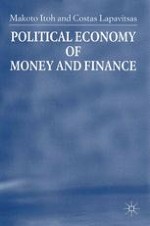1999 | OriginalPaper | Buchkapitel
Value and Money in Marx’s Political Economy
verfasst von : Makoto Itoh, Costas Lapavitsas
Erschienen in: Political Economy of Money and Finance
Verlag: Palgrave Macmillan UK
Enthalten in: Professional Book Archive
Aktivieren Sie unsere intelligente Suche, um passende Fachinhalte oder Patente zu finden.
Wählen Sie Textabschnitte aus um mit Künstlicher Intelligenz passenden Patente zu finden. powered by
Markieren Sie Textabschnitte, um KI-gestützt weitere passende Inhalte zu finden. powered by
The labour theory of value is the cornerstone of Marx’s theoretical system in economics. Marx’s formulation of the theory stressed the historically specific character of the capitalist economy, while on the whole the classical school treated the market economy and capitalism as the natural order of economic life.1 The neglect of the historical specificity of market relations and capitalism resulted in the ultimate failure of the classical school to discover the origin of the forms of value, money and capital. Section 2.1 of this chapter examines Marx’s theory of value and ascertains the logical foundations for the emergence of the form of money. The relation of money to the substance of value, that is, to socially necessary labour time, is also examined. Section 2.2 turns to the several functions performed by money in a capitalist economy. Finally, Section 2.3 considers the problem of the very early historical emergence of money and its implications for the relation between money and commodity exchange.
